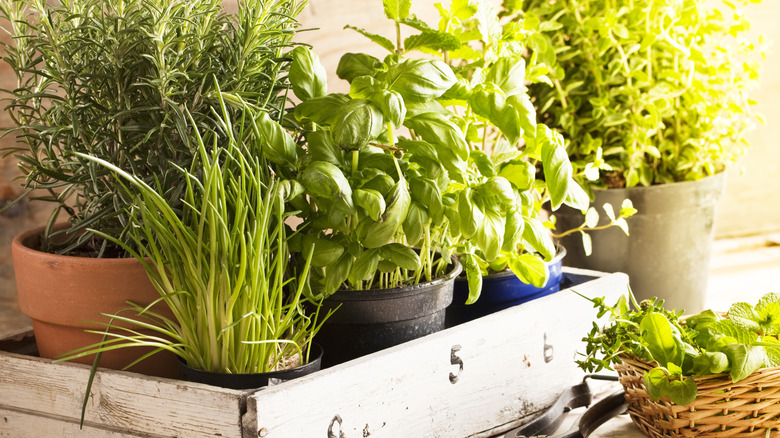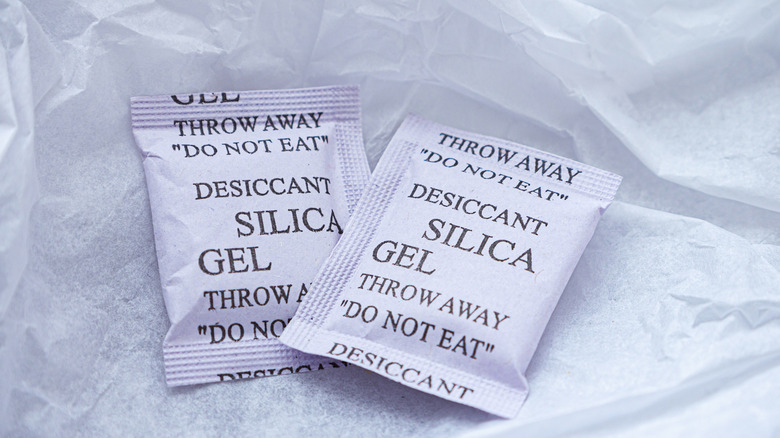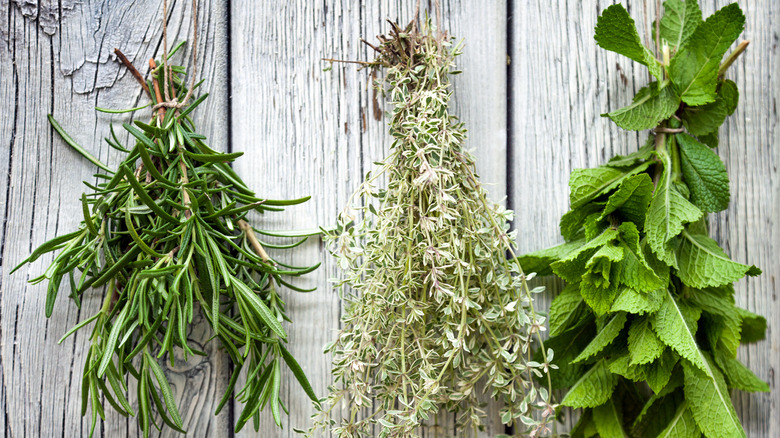The Science Behind Why Silica Packs Can Help Your Herb Storage Woes
Cilantro, rosemary, and chervil — oh my! Where would we be in the kitchen without herbs? Whether you're grinding up basil for a batch of pesto, or chopping up some parsley for gremolata, herbs bring so much to the table. The trouble is, these delicate plants are often highly perishable, and if you don't use up the whole bunch within a few days, chances are it'll rot, or get moldy. Wasted herbs aren't just a waste of food, they're also usually expensive, so letting them go bad is like throwing money in the trash. If you want to stretch out the life of your herbs, one secret weapon to consider is silica gel packs. These little envelopes that are most commonly found in pill bottles and electronics contain granules of silica gel, which absorbs moisture.
If you find yourself constantly tossing out bunches of slimy cilantro, try saving food-safe packets of silica gel and popping them in the bag or box with your herbs to keep them fresher longer. The granules will absorb excess moisture to keep them from getting moldy and rotten. You can also use silica to dry out your herbs, so you can keep them in the pantry all year round.
Silica gel science
You might not have thought much about silica gel packets other than to toss them out when you open up a box with electronics or medicine, but these little grains are desiccants — meaning, they suck up water in the air. According to Discover Magazine, the granules are made up of silicon dioxide, which is also commonly found in sand. Silicon gel is mostly made from quartz sand, which gives it its water-absorbing qualities. Every granule in each silica packet can absorb up to 40% of its weight in moisture.
In your kitchen, you can use silica gel packets to keep fresh herbs from going bad just by storing a packet with the greens. Leafy herbs like parsley, cilantro, and mint are all vulnerable to rot and mold if left in the crisper drawer for too long. Basil is especially sensitive to moisture, as well as temperature, so in the fridge it will turn brown but when it's left on the counter it'll grow mold in a few days. You can either try to use up all your basil, or store it with some silica. When you pop a silica packet into the bag or plastic box with your fresh herbs, it'll absorb the moisture that usually accumulates inside the container, which in turn will slow down mold and rot. It will even slow down the process if you leave your box of fresh basil out on the counter.
Drying herbs
Fresh herbs aren't the only application for silica gel packets, of course. If you grow herbs in your garden, or you go a little overboard at the farmer's market, you can also use them to help dry your herbs for later. While silica gel alone won't dry your herbs, you can incorporate a few packets when air drying to help speed the process along. There's a caveat, though. Be sure to only use packets that are food safe — you can either order on the internet, or reuse packets that came from foods like dried nori or other seaweed, or the ones that come in bottles of medicine. Also, leave the granules in their packets so they don't come in contact with your fresh herbs.
If you've already got some homemade or store-bought dried herbs, you can also pop a packet into any jars if you're having trouble with clumping. This is more of a problem in humid climates, but it can happen anywhere there's latent moisture in the air. Again, be sure to only use food-safe silica gel packets, and be sure they're securely closed so that the silica gel doesn't get into your food. Keep your eyes out for those little silica gel packets when they pass through your kitchen, and don't toss them in the trash. Your herbs will thank you.


